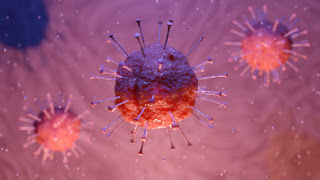CORONAVIRUS- WHAT YOU NEED TO KNOW
Yesterday World Health Organization declared coronavirus (COVID_19) pandemic. Coronavirus cases have been reported in more than 125 countries of the world. The virus originated in China 's Wuhan city. Unfortunately so far no treatment or vaccine has been created. Here in this post the symptus, loss and preventive measures besides some other relevant important aspects are briefly described so that the readers can learn to keep themselves and their dear ones safe.
HOW IT SPREADS
A comprehensive study as how exactly this virus spreads is yet to be done but so far the medical experts throughout the world tell that it is not spreading through air . When a healthy person comes into physical contact with an affected patient the cough droplets or the running nose droplets of the patient if reach the healthy person it is just transfer of the virus from one to the other. The disease is caused when these droplets through hands or by any other mean reach up to the mouth , eyes or nose of the latter one. The virus is transmitted only through touching whether the droplets are directly touched from the already affected one or from any thing where the droplets got stuck on.SYMPTOMS
According to WHO, the common symptoms found in the coronavirus affected person are shortness of breath, breathing difficulties, fever, cough and any respiratory symptom. In severe cases, kidney failure, respiratory syndrome and pneumonia can be caused leading more likely to death.DEATH RATIO/ MORTALITY RATE
On March 3, during media briefing on Covid-19, WHO Director-General Dr Tedros Adhanom Ghebreyesus said, “Globally, about 3.4% of reported COVID-19 cases have died. By comparison, seasonal flu generally kills far fewer than 1% of those infected.”
AFFECTED PARTS OF THE WORLD
Until today 125 countries including China, USA , Britain, Saudi Arabia , Iran , Italy and Pakistan are the affected countries where cases and deaths have been reported.
PREVENTION
WHO suggests following preventive measures:
1. Avoid from any type of gatherings.
2. Wear face masks if you are affected or to meet the affected.
3. Wash hands frequently with a soap and water at least for 20 seconds especially when you come from somewhere outside to your homes and offices.
4. Use sanitisers on hands.
5. Avoid touching your eyes,nose and mouth.
TREATMENT
Unfortunately no treatment / vaccine has been invented so far.








Comments
Post a Comment